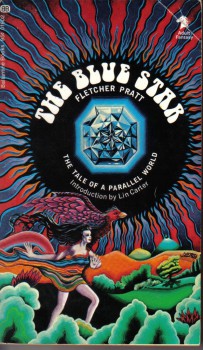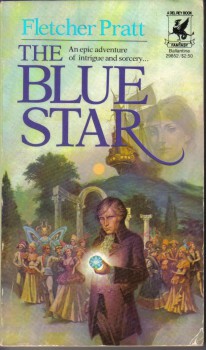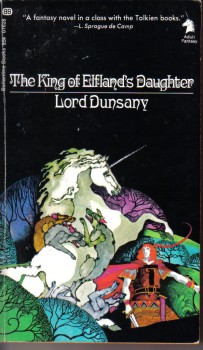The Ballantine Adult Fantasy Series: The Blue Star by Fletcher Pratt
 The Blue Star
The Blue Star
Fletcher Pratt
Ballantine Books (242 pages, May 1969, $0.95)
Cover art by Ron Walotsky
Lin Carter chose Fletcher Pratt’s novel The Blue Star to be the inaugural title in Ballantine’s Adult Fantasy series. I’ve found nothing that explicitly says why this novel rather than another, but a remark in his introduction provides a clue.
Prior to this publication, The Blue Star had only been published in an omnibus edition along with Fritz Leiber’s Conjure Wife and James Blish’s There Shall be no Darkness in 1952. This was 17 years prior to Ballantine reprinting it and two years before The Lord of the Rings was first published. Carter wrote, “I am pleased to have been instrumental in getting this remarkable novel back into print again.”
The novel tells the story of Rodvard Bergelin, who is a clerk in the genealogical offices of the Empire in the capital city of Netznegon. Not given an actual name, the Empire is in decay. Ruled by a Queen whose only heir has been exiled, political intrigue abounds. Rodvard is a member of a revolutionary group known as the Sons of the New Day. They have Bolshevik overtones, but when they eventually gain power, things resemble the French Revolution.
The other protagonist is a young woman who is a witch, Lalette Asterhax. In Pratt’s world, magic is real, but only witches can use it. The only exception is through a gem known as a Blue Star. Not all witches have one, but Lalette does. The power to be a witch is hereditary, passed from mother to daughter. A witch gains her powers when she loses her virginity.
The Sons of the New Day order Rodvard to seduce Lalette. Neither is really interested in the other. Rodvard is taken with a voluptuous young noblewoman who has started hanging around his office. Lalette, on the other hand, is being pursued by an old nobleman, Count Cleudi. In order to get away from him and out from under her mother’s thumb, Lalette reluctantly yields to Rodvard’s advances.
John O’Neill has been posting about the Appendix N readings of Mordicai Node and Tim Callahan. They recently looked at this novel. One of the big issues they had with the story was this part. (John’s comments on their assessment are here.)
Mordicai takes Pratt to task for making Rodvard a rapist. My initial impression was that Lalette did willingly yield to Rodvard eventually, even if she did resist at first. I decided to take a second look at the scene.
Rodvard has been aggressive and not taking “No” for an answer. Here’s how things play out:
“Let me go!” she cried again in a strangled voice, and convulsing, struck him on the side of the head with her free hand. At that moment her laces gave, her hand came round his head rather than against it, drawing his face down in a long sobbing kiss, through which a murmur, softer than a whisper: “All right, oh, all right, go on.” (There was one little flash of triumph across her mind, one little trouble solved, Cleudi would never want her now.)

This paragraph was pretty much as I remembered it. What stood out more on a second reading was the aggressiveness of Rodvard in the half page preceding. The description is mixed with dialogue, and if you ignore the dialogue (which I didn’t the first time), the action is quite chilling. Because of length, I’ll not quote that passage.
So, on a closer reading, I’m inclined to agree with Mordicai. Even if Lalette did eventually yield of her own free will, Rodvard forces himself on her to the extent that he is a rapist.
Upon his union with Lalette, Rodvard is given possession of the Blue Star. This was the intention of the Sons of the New Day all along. A man who gains a Blue Star has the ability to read the mind of anyone with whom he makes eye contact. He will have this ability as long as he doesn’t have sex with any other woman. Rodvard will have plenty of opportunities to test his faithfulness.
No sooner than Lalette gains her powers is she exposed as a witch and forced to flee. It seems that even though witchery is common, it’s frowned upon by almost all powers and authorities, including the Church.
Lalette turns to Rodvard for help, but as soon as the Sons of the New Day learn he was successful in his mission, they send him to be Cleudi’s secretary at a major government summit. The Empire is broke, and the nobles are trying to figure out what to do about it before the Queen finds out. Once there, the Sons of the New Day involve him in a number of intrigues, mostly against his will.
Lalette, meanwhile, ends up fleeing to another continent to escape. It’s sort of like jumping from the frying pan into the fire. She’s in the custody of a religious sect in which she is expected to make herself sexually available to the initiates. As an act of love towards God, of course.
And this brings up another aspect of the book that might not sit well with some of today’s readers. Women are viewed as sex objects. A lot. Most of the women are portrayed as licentious to a greater or lesser degree. Those who aren’t tend to be bitter harridans. There aren’t really any women ho are portrayed with a sense of balance.
The fact that it’s often the villains who treat women thus doesn’t make it any easier to read at times. While at the summit, Rodvard is ordered to pose as Cleudi at a masked ball for the purpose of seducing a noblewoman and then publicly humiliating her. Again, he goes along with the scheme even though he knows it’s wrong.

There are a number of intrigues and betrayals in the book. While the plot does move, at times I found it to plod when it should have charged. Rodvard and Lalette are both given to bouts of introspection and philosophizing.
In fact, Pratt uses a framing sequence set in our world in which three men discuss at some length philosophy and what the world would be like if witchcraft were real. After their discussion, they retire and all dream the same dream, which is the story told in the novel. Carter went so far in his introduction as to encourage the reader to skip the framing sequence.
In many ways, The Blue Star reminded me of those early novels I was forced to read in English class. Early in the historical sense, when the novel hadn’t evolved very far as an art form. The kind which had a moral or lesson, and in which the protagonist tended to be swept along by the events of life, events which were often beyond his control.
And ultimately that was why I found The Blue Star unsatisfying. It wasn’t the out of date style of writing, where the characters were given to much introspection, or more description than is found in most genre fiction these days. Those things were actually a nice change from contemporary writing styles.
Rather it was the fact that both Rodvard and Lalette were so passive that set my teeth on edge. Each of them let others determine their fates. They only roused themselves and took some initiative when they were truly at risk. For example, the Sons of the New Day confiscate a generous tip Cleudi gives Rodvard, saying it should go to the general coffers then rail at him because he needs money to complete his assignments. And he willingly puts up with it.
 In his introduction, Carter discusses how Pratt despised sword and sorcery or any kind of swashbuckling adventure. That was pretty obvious from reading the novel. One of Robert E. Howard’s or Edgar Rice Burroughs’ heroes would never have stood for the things Rodvard or Lalette puts up with.
In his introduction, Carter discusses how Pratt despised sword and sorcery or any kind of swashbuckling adventure. That was pretty obvious from reading the novel. One of Robert E. Howard’s or Edgar Rice Burroughs’ heroes would never have stood for the things Rodvard or Lalette puts up with.
The problem with Pratt’s approach is that his protagonists aren’t people I can respect. Rodvard goes along with schemes he knows are wrong, including rape. The remorse he feels afterward isn’t so much regret as fear of consequences. Even when his conscience tells him a course of action is wrong, he rarely shows enough spine to say “No.”
Lalette shows a little more conscience, but she follows orders too willingly and ends up in situations she could have easily avoided. In time they both rebel, but it’s a passive rebellion.
The Blue Star is very much in the vein Carter wrote about in his opening to the introduction, in which he states that the Adult Fantasy series will consist of works geared towards adults rather than children. I doubt a child would wade through this one, or even understand most of it.
The Blue Star did hold my interest. I’m glad I read it, but Pratt didn’t seem to capitalize on the potential. But then, I love sword and sorcery and swashbucklers. I can understand why The Blue Star is not regarded as one of the great classics of the field.
The second book in the Adult Fantasy series is The King of Elfland’s Daughter by Lord Dunsany. That’s what we’ll look at in the next installment.
Our other coverage of Fletcher Pratt includes:
The Compleat Enchanter by L. Sprague de Camp and Fletcher Pratt
Tales From Gavagan’s Bar by L. Sprague de Camp and Fletcher Pratt
Land of Unreason by Fletcher Pratt and L. Sprague de Camp
L. Sprague de Camp, Fletcher Pratt, Gardner Fox and Appendix N: Advanced Readings in D&D
Manly Wade Wellman, Fletcher Pratt, and Appendix N: Advanced Readings in D&D
The Well of the Unicorn by Fletcher Pratt
The Blue Star by Fletcher Pratt
World of Wonder edited by Fletcher Pratt
See all of our recent Vintage Treasures here.
Given your review, I think I’ll pass. This book does not sound interesting at all.
[…] just a quick note to let you know my latest post on the Ballantine Adult Fantasy Series is up at Black Gate. I’m looking at the first volume […]
Sftheory1, it’s not for everyone, that’s for sure.
Thanks for the review, very in-depth.
I’m looking forward to your posts on this series. I’m currently collecting these Ballantine editions and trying to read the ones that I haven’t read yet.
Despite the problems you’ve listed, I’m actually intrigued to try and give The Blue Star a go when I get it.
Thanks, James. I’d like to know what you think when you read it. I’ve got a spare copy. Shoot me an email at keith at adventuresfantastic dot com with your address, and I’ll send it to you after get back from Christmas travel.
Thanks westkeith! I’ll email you soon!
You might prefer “The Well of the Unicorn.” http://www.amazon.com/Well-Unicorn-Fletcher-Pratt/dp/0345283597/ref=pd_sim_sbs_b_2
It follows a more conventional heroic narrative – more or less. I’ve read it two or three times over the years and enjoyed it. Though – fair warning – the end leaves something to be desired. It reads as book one of a longer series that never materialized.
Thanks for the suggestion, Ken. I’ve got a copy of The Well of the Unicorn on the shelf. I’m intending to give it a try sometime in the spring, if I ever clear some titles in my TBR stack. The cover on the edition I’ve got is by Tim and Greg Hildebrandt and is very much in the vein of their LotR work. I think I might enjoy it more than The Blue Star.
I’ve read Blue Star a couple of times as part of grand BAF reread projects. Only read Well of the Unicorn once and that was back when I was in college, I think. I recall it being thick going, but I should really revisit it one of these years. If I’m remembering correctly, the world itself is lifted from something by Dunsany?
I haven’t heard that about Dunsany, Joe. I’ll have to look into it.
Thanks for the review. Definitely going to look for it and add it to my shelf for the sake of collecting another Ballantine at least.
Frankly, I’m wild about Lord Dunsany, so I look forward big time to your opinions on possibly his best work that the late, great Lin Carter saved from obscurity.
GreenGestalt, I’ve not read a great deal of Dunsany. I’m about 50 pages in on The King of Elfland’s Daughter. So far, I’m enjoying it much more than I did The Blue Star.
Reading through the Ballantine series is a nifty idea. I’ve read only a fraction of them, and, candidly, I think I would find a fair number of the books unreadable now. But I like the idea. It was an exciting series and accomplished what Carter intended, to show there was much more in the fantasy vein than Tolkien’s books and a few others. Many of the covers were attractive. It’s amusing to do a thought experiment and imagine how different the books would have looked if Ace had printed them (Gaughan et al.). Many of the Ace Adult Fantasy Series books would, no doubt, have been attractive in their own way, but I doubt they would have attracted the attention of people who weren’t yet fans as the BB ones did… Interesting marketing topic!
…I suppose the Ace Adult Fantasy Series might have had cover art by the Dillons… now that could have been nice.
[…] The second volume Lin Carter chose for the Adult Fantasy line was Lord Dunsany’s The King of Elfland’s Daughter. In my opinion, it is it far superior to Fletcher Pratt’s The Blue Star. […]
[…] Carter and the Ballantine Adult Fantasy Series The Ballantine Adult Fantasy Series: The Blue Star by Fletcher Pratt The Ballantine Adult Fantasy Series: The King of Elfland’s Daughter by Lord […]
[…] most prestigious work was the creation of the Ballantine Adult Fantasy Series (being reviewed one volume at a time here on Black Gate by Keith West). It resurrected many of the forebears of genre fantasy […]
[…] Carter and the Ballantine Adult Fantasy Series The Blue Star by Fletcher Pratt The King of Elfland’s Daughter by Lord Dunsany The Wood Beyond the World by William […]
[…] Carter and the Ballantine Adult Fantasy Series The Blue Star by Fletcher Pratt The King of Elfland’s Daughter by Lord Dunsany The Wood Beyond the World by William Morris Lilith […]
[…] Carter and the Ballantine Adult Fantasy Series The Blue Star by Fletcher Pratt The King of Elfland’s Daughter by Lord Dunsany The Wood Beyond the World by William Morris Lilith […]
I just finished this book and so I came back to reread this post (which I originally read when it was posted in December, 2013).
I found westkeith’s analysis to be “spot on.” Nothing more I can add. I did find the book enjoyable enough that I want to read more of Pratt though.
Thanks for putting me on to this book westkeith. (Come to think of it, I think westkeith sent me my copy of the book–double thanks then!)